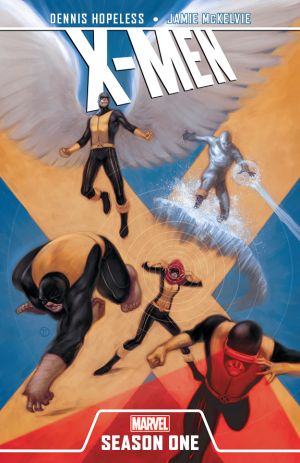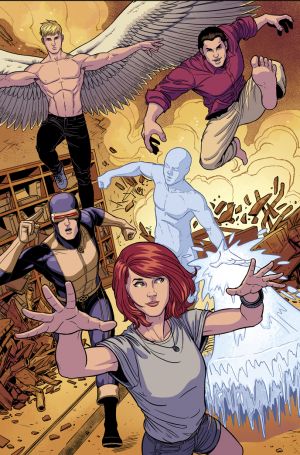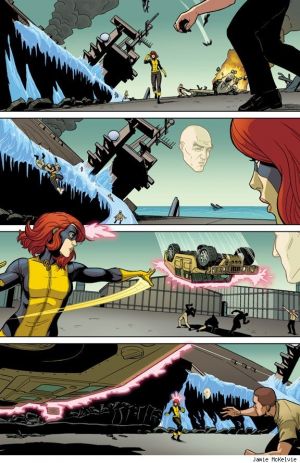Marvel Comics
X-Men Season One Review
By Andy Frisk
July 30, 2012 - 10:00
Marvel Comics
Writer(s): Dennis Hopeless
Penciller(s): Jamie McKelvie
Inker(s): Mike Norton
Colourist(s): Mathew Wilson
Letterer(s): VC’s Clayton Cowles
Cover Artist(s): Julian Totino Tedesco
$24.99 US
Told from the perspective of the only girl at the Xavier Institute, Jean “Marvel Girl” Grey, writer Dennis Hopeless (GearHead, Lovestruck) retells the origin of the original X-Men that brilliantly weaves their original early adventures like Magneto’s assault upon Cape Citadel from X-Men (1963) #1, the Blob’s carnival background origin from X-Men (1963) #3, the X-Men’s adventure in the Savage Land from X-Men (1963) #10, their battle against Unas The Untouchable from X-Men (1963) #8, Beast’s quitting the team, and the threat of The Sentinels (both also from the early issues of the 1963 series) with some smartly written filler story that not only expands upon these early storylines, but solidifies them as canon in the X-Men’s tales. Touching intelligently and wittily upon the various love triangles and misadventures in romance that these teens experience (mostly between Jean, Warren Worthington III, and Scott Summers) while also delving deeply into the solid, and established, character traits of them all (including Prof. Charles Xavier), X-Men Season One is honestly the only X-Men origin tale that anyone new to the X-Men will need, and that long term fans will continually cherish rereading. Every character nuance, subplot, and insight is handled masterfully by Hopeless, and they mesh together so well that there will, once again, never be another need for an X-Men origin tale, until of course the technology and setting of X-Men Season One becomes hopelessly (no pun intended) outdated.
I was pretty wary of these slightly overpriced, and topically gimmicky, “modernized origins” of Marvel Comics’ biggest superheroes, collectively united under the moniker of “Season One.” They seemed like a poor response to DC Comics’ Earth One hardcovers, and while (in some ways) they are, they are not reboots, or multiverse tales. They are actual in continuity stories that pay homage to the original 1960s origin tales of these heroes, but update them without rebooting them. In short, Season One demonstrates Marvel Comics’ inherent strength to avoid the hard reboots that have gone on to plague DC Comics’ line of superhero comic books, while keeping their heroes fresh, relevant, and up to date. In X-Men Season One, Dennis Hopeless manages to bounce back and forth within a span of what might be only a year of the X-Men’s first adventures. He hits all the highlights of the first year of the original 1963 series though, not only updating those early stories, but re-injecting some of the humor and wit that Stan Lee and Jack Kirby injected into the original X-Men’s stories. It’s a humor that has been sorely missing from the X-Men’s contemporary tales.
This isn’t to say that X-Men Season One abandons the important morals and ethics about prejudice and acceptance that the X-Men’s stories have always championed in favor of jokes. It’s more like Hopeless has recaptured a bit of that “Excelsior!” like energy that Lee and Kirby thrived on back in the day. Events like Bobby Drake/Iceman’s stumbling upon Magneto’s downtown New York apartment headquarters, his childlike excitement over his discovery, and Jean’s teenaged exasperation over Scott Summers/Cyclops’ cluelessness over the signals she’s sending to him revealing that she’s in to him liven up what is otherwise a pretty serious story about the differences between Magneto’s Malcolm X approach to mutant politics and action and Xavier’s MLK approach. It is the only X-Men comic book that I’ve read since the excellent X-Men First Class (2011) film that manages to capture the wit and tone of that film. X-Men First Class was the first Marvel Comics movie (until The Avengers of this year) to capture Lee and Kirby’s original enthusiasm and intent.
X-Men Season One artists James McKelvie, Mike Norton, and Mathew Wilson also manage to capture some of the original enthusiasm and kinetic energy that Kirby drew into the X-Men’s original adventures just as well as Hopeless manages to write it into this tale. Clear, crisp, and sharply defined lines and images dominate the look of the art here. The backgrounds of the panels are a little less detailed than I like in spots, but they emulate the hit and miss detail that Kirby worked into the pages of the original X-Men (1963) series' art. Norton’s colors pop off the page and are bright and sharp themselves, recalling the original four color brightness of the original X-Men (1963) series’ early issues.
Picked up on a lark with some extra cash, X-Men Season One has proven to be not only a great surprise, it’s become one of my favorite X-Men reads of all time and a prized addition to my X-Men collection of comics. It’s definitely inspired me to pick up some of the other Season One books that are out or coming out soon. If they end up being only half as good as X-Men Season One, they’ll be more than worth the purchase.
Rating: 10/10
Related Articles:
Astonishing X-Men Cyclops
Review: X-Men God Loves, Man Kills Extended Cut
X-Men Dark Phoenix – the Rebirth of a Franchise?
Review: Astonishing X-Men #7
X-Men: Grand Design #1 comics review
Review: X-Men Gold #9
X-Men Gold #2 And The Rebirth of Progressivism at Marvel Comics?!
X-Men Gold #1 and the Death of Progessivism at Marvel Comics
Marvel's X-Men Separate But Equal
Review: Amazing X-Men #8



